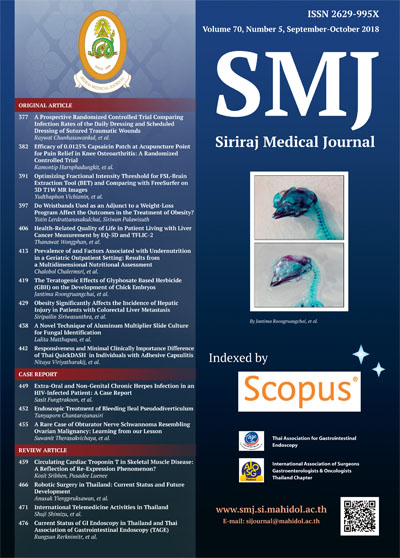Responsiveness and Minimal Clinically Importance Difference of Thai QuickDASH in Individuals with Adhesive Capsulitis
Keywords:
MCID; adhesive capsulitis; Thai QuickDASH; irritability outcomeAbstract
Objective: To explore consistency between clinical outcomes derived from patient self-assessment and physical
therapy evaluation. Also, to determine the minimal clinically importance difference (MCID), responsiveness, and
optimal cut-off point specific to adhesive capsulitis for conditions of high and low disability, using the Thai version
of QuickDASH.
Methods: A cohort study was conducted in two hospitals over six weeks of physical therapy. Eighty-seven adhesive
capsulitis patients participated in this study. Clinical outcomes provided by participant self-assessment using Thai
QuickDASH and Global Rating of Change (GRoC) scales were compared with irritability outcomes provided by a
physical therapist. Thai QuickDASH is the validated outcomes measurement tool for adhesive capsulitis and GRoC
is recommended as a standard external anchor. This anchor-based method and receiver-operating characteristics
(ROC) were analysed to clarify MCID and responsiveness.
Results: The highest correlation was between the Thai QuickDASH and pain during passive shoulder elevation
(rho = 0.638). MCID scores ranged from 9.1 to 20.4. The optimal cut-off point between high and low disability was
31.8, attained by a combination of two references; one was a score of at least GRoC+1 and the other was irritability
outcome defined by pain during passive shoulder elevation.
Conclusion: Responsiveness and MCID measured by the Thai QuickDASH is specific to adhesive capsulitis.
A combination of GRoC as a standard external anchor and irritability outcome gave a precise cut-off point for
improvement. Overall management of adhesive capsulitis, including continuing evaluation, treatment justification,
and decision planning, should be based on qualified confirmation of MCID and responsiveness.
Downloads
Published
How to Cite
Issue
Section
License
Authors who publish with this journal agree to the following conditions:
Copyright Transfer
In submitting a manuscript, the authors acknowledge that the work will become the copyrighted property of Siriraj Medical Journal upon publication.
License
Articles are licensed under a Creative Commons Attribution-NonCommercial-NoDerivatives 4.0 International License (CC BY-NC-ND 4.0). This license allows for the sharing of the work for non-commercial purposes with proper attribution to the authors and the journal. However, it does not permit modifications or the creation of derivative works.
Sharing and Access
Authors are encouraged to share their article on their personal or institutional websites and through other non-commercial platforms. Doing so can increase readership and citations.











